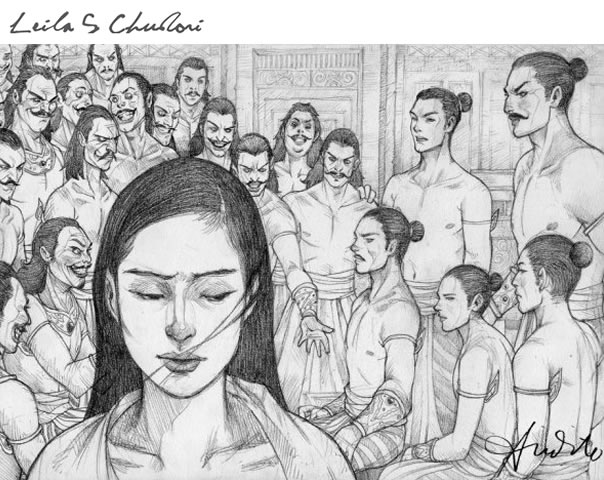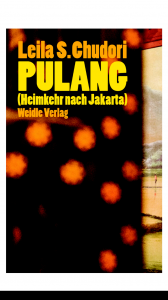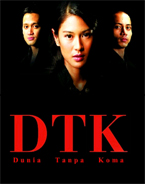About Leila
 Leila Salikha Chudori (born in Jakarta, 12 December, 1962), known to her readers as Leila S.Chudori, is an Indonesian author who has written short stories since a young age, a best-selling novel, and a television series. She is considered one of Indonesia’s boldest story-tellers; her style is unconventional and her themes include such taboo subjects as state absolutism, chauvinism and the hypocrisy of public mores. Both her style and themes mark her as an exceptional figure in the Indonesian literary scene.
Leila Salikha Chudori (born in Jakarta, 12 December, 1962), known to her readers as Leila S.Chudori, is an Indonesian author who has written short stories since a young age, a best-selling novel, and a television series. She is considered one of Indonesia’s boldest story-tellers; her style is unconventional and her themes include such taboo subjects as state absolutism, chauvinism and the hypocrisy of public mores. Both her style and themes mark her as an exceptional figure in the Indonesian literary scene.
Chudori’s early works began publication in 1974 when she was 12, in popular Indonesian children’s magazines, including Si Kuncung, Kawanku, and Hai. These early short stories had titles such Sebuah Kejutan (“A Surprise”); Empat Pemuda Kecil (“Four Little Men”) and Seputih Hati Andra (“As Pure As Andra’s Heart”).
 In her adult career, her short stories were published in Indonesian magazines such as Zaman weekly, Horison literary magazine, Matra men’s magazine, Solidarity (Philippines), Menagerie (Indonesia), and Southeast (Malaysia). Her collection of short stories, Malam Terakhir (“The Last Night” published by Pustaka Utama Grafiti, Jakarta, 1989), have been translated into other languages, including German (Die Letzte Nacht, published by Horlemann Verlag), while some of her short stories were published in the Menagerie Indonesian literary anthology published by the Lontar Foundation.
In her adult career, her short stories were published in Indonesian magazines such as Zaman weekly, Horison literary magazine, Matra men’s magazine, Solidarity (Philippines), Menagerie (Indonesia), and Southeast (Malaysia). Her collection of short stories, Malam Terakhir (“The Last Night” published by Pustaka Utama Grafiti, Jakarta, 1989), have been translated into other languages, including German (Die Letzte Nacht, published by Horlemann Verlag), while some of her short stories were published in the Menagerie Indonesian literary anthology published by the Lontar Foundation.
The late Indonesian literary critic, H.B Jassin, in his foreword to Malam Terakhir, said that Chudori’s prose is filled with honesty, determination, ambition and principles. Jassin noted that Chudori ‘s short stories show influences by writers such as Franz Kafka, Dostoevsky, D.H. Lawrence and James Joyce, as well as her fascination for the Bharatayudha and Ramayana epics, and the world of Indonesian Wayang. With these influences, said Jassin, it is not surprising that Leila portrays her characters with a deep consciousness and independence of spirit, and that she uses her imagination to create havoc in space and time, filling it with illusion and hallucination, juxtaposing personal experience and appreciation with mythological stories. With the diffusion of this technique, Leila has created a new dimension, he wrote. According to .Jassin, a noteworthy feature in Chudori’s fiction is her courage to discuss themes controversial in Indonesia’s traditional society. Jassin concluded that Chudori’s story-telling is both intellectual and poetic and reveal fresh philosophical viewpoints.
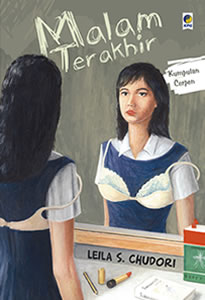 Chudori’s form and language are varied and ambiguous. She has a deep knowledge of both her own culture and that of Western societies, especially in Anglo-Saxon literature, which first caught her attention while studying in Canada. In her sensitive and reflective fiction, Chudori creates a dialogue between the traditional and the modern, while managing to maintain a universality sensibility of human rights, notedly in her narratives about imprisoned dissident students waiting at night to be killed. This she contrasts with a very different type of social class by portraying a discussion between a well-to-do member of the ruling regime and his doubting daughter. The moody assertions of the male character suggest murderous rhetoric rather than neutral reflections. His daughter is not won over, and the students are killed the next day.
Chudori’s form and language are varied and ambiguous. She has a deep knowledge of both her own culture and that of Western societies, especially in Anglo-Saxon literature, which first caught her attention while studying in Canada. In her sensitive and reflective fiction, Chudori creates a dialogue between the traditional and the modern, while managing to maintain a universality sensibility of human rights, notedly in her narratives about imprisoned dissident students waiting at night to be killed. This she contrasts with a very different type of social class by portraying a discussion between a well-to-do member of the ruling regime and his doubting daughter. The moody assertions of the male character suggest murderous rhetoric rather than neutral reflections. His daughter is not won over, and the students are killed the next day.
After 20 years of writing short fiction, Chudori published the anthology 9 dari Nadira (“Nine Stories from Nadira”, published by Kepustakaan Populer Gramedia, 2009) and reissued Malam Terakhir.
 The collection 9 dari Nadira is an anthology of nine stories relating how Nadira’s family faces the sudden death of their mother. Although the author insists it’s a collection of short stories, some literary critics consider the work a novel. According to Tineke Hellwig of the University of British Columbia, “What makes Leila S. Chudori’s 9 dari Nadira such an enjoyable read and an excellent piece of literature is that the novel stands out… It touches upon a wide range of emotions and aspects of the human condition that we, as readers, easily recognize and with which we can empathize and identify.” In an essay titled Contemporary Fiction Writing in the East, Hellwig is of the opinion that Chudori’s 9 dari Nadira is a “complex narrative” with “authenticity in reality”. Hellwig noted that the nine chapters of the book flow effortlessly together into one coherent storyline. Its numerous cross-references signify the complex narrative that 9 dari Nadira really is. Certain significant elements that recur from chapter to chapter point to meaningful connections: the seruni flower, the grandfather’s rosary beads, Kemala’s black diary book, Candra Kirana and Nadira’s scars on their foreheads.
The collection 9 dari Nadira is an anthology of nine stories relating how Nadira’s family faces the sudden death of their mother. Although the author insists it’s a collection of short stories, some literary critics consider the work a novel. According to Tineke Hellwig of the University of British Columbia, “What makes Leila S. Chudori’s 9 dari Nadira such an enjoyable read and an excellent piece of literature is that the novel stands out… It touches upon a wide range of emotions and aspects of the human condition that we, as readers, easily recognize and with which we can empathize and identify.” In an essay titled Contemporary Fiction Writing in the East, Hellwig is of the opinion that Chudori’s 9 dari Nadira is a “complex narrative” with “authenticity in reality”. Hellwig noted that the nine chapters of the book flow effortlessly together into one coherent storyline. Its numerous cross-references signify the complex narrative that 9 dari Nadira really is. Certain significant elements that recur from chapter to chapter point to meaningful connections: the seruni flower, the grandfather’s rosary beads, Kemala’s black diary book, Candra Kirana and Nadira’s scars on their foreheads.
Writer Agus Noor wrote in the Indonesian Kompas daily that 9 dari Nadira is evidence that “the golden child of Indonesian literature is back”. With the publication of her latter work, Chudori was invited to speak at the Salihara Indonesian Literary Bienalle in Jakarta in October 2009, the Asia Pacific Literary Symposium in Perth Australia in 2011; the Winternachten Literary Festival held by Writers Unlimited in the Hague in 2012; and the Leila Chudori Soirée Events Literature Association held by Indonesia-France in Paris Night Market, also in January 2012.
Selected stories from 9 dari Nadira and Malam Terakhir are in the process of translation into English by the Lontar Foundation. With the title The Longest Kiss, the merger of these two anthologies are being translated and edited by Pamela Allen, Jennifer Lindsay, John McGlynn, Sandra Taylor and Claire Siverson. In her introduction to the translated work, Pam Allen of the University of Tasmania, Australia, stated that ,“like Leila, the protagonists of the stories in this translated collection all crave that private domain. They share with their creator a passion for words, for writing, and for literature.” Allen noted thhat Chudori’s characters “are feisty, non-conformist and fiercely independent—traits that do not necessarily serve them well in the constraints of the conservative environments in which they find themselves, be that the environment of their family, their work, or their country.”
In 2011, 9 dari Nadira was awarded the Penghargaan Sastra Badan Bahasa Indonesia (Literary Award of the Indonesian Language Board).
At the end of of 2012, Leila finally published her first novel, Pulang (“Home”), published by Kepustakaan Populer Gramedia, and launched at the Goethe Institute in Jakarta. Chudori spent six years doing research for the work and paid two visits to Paris to interview among others, political exiles Oemar Said and Sobron Aidit (who both in the interim passed away), and many former political prisoners in Jakarta, including journalist-poet Amarzan Loebis and activist Djoko Sri Moeljono, who had been imprisoned on the infamous Buru Island under the Soeharto military regime.
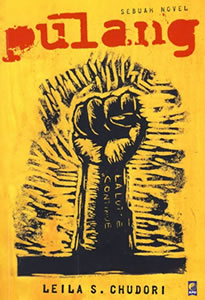 Pulang, 458 pages long , tells a saga encompassing two generations of people. It starts with the tale of four Indonesian journalists – Dimas Suryo, Nugroho, Risyaf and Tjai, who are banned from returning to their homeland following the aftermath of the Communist purge in Indonesia in 1965. While Dimas’ friends and family members are slaughtered or tortured for information in Indonesia, the four friends move from country to country seeking political asylum, finally landing in France and eking out a living by opening the Indonesian eatery Restoran Tanah Air (based on an actual “Restoran Indonesia” on Rue de Vaugirard, Paris, founded by the late Oemar Said, and writer Sobron Aidit, younger brother of Indonesian Communist party leader D.N. Aidit and J .J. Kusni).
Pulang, 458 pages long , tells a saga encompassing two generations of people. It starts with the tale of four Indonesian journalists – Dimas Suryo, Nugroho, Risyaf and Tjai, who are banned from returning to their homeland following the aftermath of the Communist purge in Indonesia in 1965. While Dimas’ friends and family members are slaughtered or tortured for information in Indonesia, the four friends move from country to country seeking political asylum, finally landing in France and eking out a living by opening the Indonesian eatery Restoran Tanah Air (based on an actual “Restoran Indonesia” on Rue de Vaugirard, Paris, founded by the late Oemar Said, and writer Sobron Aidit, younger brother of Indonesian Communist party leader D.N. Aidit and J .J. Kusni).
After meeting Vivienne Deveraux on the sidelines of the student movement in May 1968, Dimas, having received a letter telling him of the execution of Hananto Prawiro, their close friend, starts telling Vivienne about his past. One half of the book tells the story of Dimas’ and Vivienne’s daughter, Lintang Utara, who decides to visit Indonesia in 1998 to make a documentary on the lives of banished Indonesians as part of her final project as a student at Sorbonne University. Things are chaotic politically yet exciting for a documentary film-maker. Lintang meets Segara Alam, the son of Hananto Prawiro, who helps her to interview families of Indonesian 1965 political activists who had suffered under the Soeharto regime. Through Lintang’s eyes and lens, readers get a portrayal of the downfall of Soeharto’s New Order.
This novel was received positively by critics and readers alike. Within three months, Pulang entered its third reprint, and is considered a best-seller according to Indonesian publishing standards. By mid 2014, Pulang has entered the fifth reprint.
Literary critic and senior lecturer at Gajah Mada University Faruk Tripoli considers Pulang, and the word “Indonesia” in the novel, as having pluralistic meaning. The characters Dimas, Lintang and Rama maintain their own interpretation of what “pulang” means, while the word “Indonesia”, consisting of the letters I, N, D, O, N, E, S, I, and A offer readers an opportunity to provide their own alternative meaning and interpretations.
Poet, essayist and founder of Tempo magazine, Goenawan Mohamad, wrote in his weekly Tempo column, Catatan Pinggir (“Sidelines”), that ”Pulang by Leila S.Chudori , in lively and captivating narrative, tells the story of those who were forced to become exiles in Europe, or who were killed in Jakarta because they were considered ‘Communists’—and also their families, friends and children… The novel is fast—reflecting the way young people think what Indonesia needs to keep running, to lose the smarting bitterness that stings in the past. The language is clever and transparent, entirely without ambiguity and obscurity.”
Bagus Takwin, a lecturer at the Faculty of Psychology of the University of Indonesia, in a paper for discussion of the novel at the Salihara art centre in January 2013, wrote that the tales of the characters in the novel give us an understanding that being “Indonesian” is an intentional desire. Being Indonesian is not pre-determined in a de jure sense, nor by validity from the government. “Indonesia”, or being Indonesian, will never be erased only because one has left the country, said Takwin, as portrayed by the characters in Chudori’s work.
Yenni Kwok of Time.com wrote that “Pulang… is a story of families and friends entangled in the cruel snare of history… The novel centers on Indonesian political exiles who are abroad during the purge, and later end up in Paris during the height of the 1968 leftist student protests there.”
Maria Hartiningsih of Kompas daily wrote in a review that, “Pulang has freed itself from the trap of glorifying the victim, that could have caused a bigger gap between the political tragedy and the humanity, and has not ended until now. It is written without social nor personal pretense.”
Amahl S.Azwar of The Jakarta Post wrote that “the readers, whether or not they are aware of the political events surrounding the stories, can still relate to the characters in their loneliness and hopes, while avoiding melodrama.” He continued by saying that “Pulang wraps up the accounts of the long lost children of Indonesia. May their stories never be forgotten.”
 In 2013, “Pulang” won Khatulistiwa Literary Award of Indonesia for prose.
In 2013, “Pulang” won Khatulistiwa Literary Award of Indonesia for prose.
July 2013, Leila Chudori and John McGlynn of Lontar Foundation had an Australian tour to launch Modern Indonesian Library, discussed and read The Longest Kiss –the translation of Malam Terakhir, 9 dari Nadira – and also Pulang, a Novel courtesy of University of Tasmania, Hobart, University of Melbourne dan Murdoch University, Perth, Australia. Leila also attended Ubud Writers and Readers Festival, Bali October 2013 and Perth Writers International Festival in February 2014 where authors such as Martin Amis and Eleanor Catton also attended. On May the same year, Leila attended Tong Tong Fair and Festival in Den Haag, Holland to discuss “Pulang”.
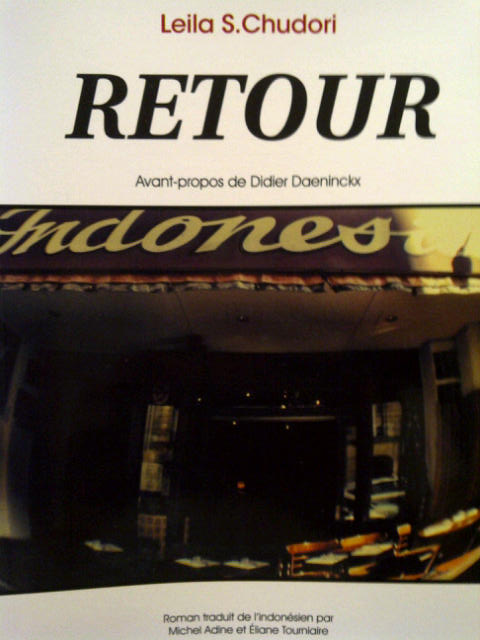 Oktober 2014, Pasar Malam , an independent publisher in France launched the French translation of Pulang in Paris. Translated by Michel Adine and Éliane Tourniaire, Retour was given a foreword by French author Didier Daeninckx who wrore: “…C’est tout le mérite du livre de Leila S. Chudori que de témoigner de ce passé en apesanteur. Pour cela, elle ne plonge pas directement sa plume dans la rage, la fureur, les cris et les effrois.”
Oktober 2014, Pasar Malam , an independent publisher in France launched the French translation of Pulang in Paris. Translated by Michel Adine and Éliane Tourniaire, Retour was given a foreword by French author Didier Daeninckx who wrore: “…C’est tout le mérite du livre de Leila S. Chudori que de témoigner de ce passé en apesanteur. Pour cela, elle ne plonge pas directement sa plume dans la rage, la fureur, les cris et les effrois.”
 “Pulang” has been translated into Dutch language by Hendrik Maier—who is known to translated Pramoedya Ananta Toer’s work into Dutch—and will be published by De Geus September 2015.
“Pulang” has been translated into Dutch language by Hendrik Maier—who is known to translated Pramoedya Ananta Toer’s work into Dutch—and will be published by De Geus September 2015.

 “Pulang” has been translated into English language by John McGlynn from Lontar Foundation and picked up by Deep Vellum (US), also will be out by October 2015 in the US and Canada.
“Pulang” has been translated into English language by John McGlynn from Lontar Foundation and picked up by Deep Vellum (US), also will be out by October 2015 in the US and Canada.
Weidle Verlag of Germany has chosen Sabine Mueller to translate it into German and became : Pulang (Heimkehr nach Jakarta) . It will be our in September by the time of internationales literaturfestival berlin September 2015 where Leila takes a part as a panelist.
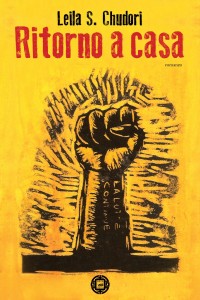 “Pulang” is also translated into Italian language by Antonia Soriente and Alfonso Cesarano and published by Atmosphere Libri. Pulang in English, Italian, German and Dutch will be a part of Frankfurt Book Fair 2015 where Indonesia is the Guest of Honour.
“Pulang” is also translated into Italian language by Antonia Soriente and Alfonso Cesarano and published by Atmosphere Libri. Pulang in English, Italian, German and Dutch will be a part of Frankfurt Book Fair 2015 where Indonesia is the Guest of Honour.
EDUCATION
Leila S. Chudori was chosen to represent Indonesia when awarded a scholarship to study at the Lester B. Pearson College of the Pacific (United World Colleges) in Victoria, Canada, for two years, receiving an International Baccalaureate. She continued studying under scholarship, taking a double major in Political Science and Comparative Development Studies at Trent University, Canada. She completed her undergraduate studies in 1988 and returned to Indonesia.
CAREER
After completing her short story anthology, Malam Terakhir, published by Pustaka Utama Grafiti ini 1989, Chudori became a journalist for Tempo News Magazine. In her early career as a journalist, Chudori was assigned to cover international issues – of note are her interviews with President Cory Aquino (1989, in Malacanang Palace, Manila), with Tianammen activist Fang Lizhi (1991, an interview that took place in Cambridge, England), with President Fidel Ramos (Manila, 1992), Malaysian Prime Minister Mahathir Mohamad (Jakarta, 1992), PLO Leader Yasser Arafat (Jakarta 1992, and Jakarta 1999), Nelson Mandela (Jakarta, 1991), and Mozambique leader Robert Mugabe (Jakarta, 2005). Chudori is now a Senior Editor of Tempo magazine, responsible for the “Language” column and film reviews. In 2008, together with Bambang Bujono, she co-edited the book, Bahasa!, a collection of essays on the Indonesian laguange, published by Tempo.
Film and Television is Chudori’s other passion, after literature. Besides writing film reviews, Chudori is the creator and script-writer of a 14-episode TV mini-series titled Dunia Tanpa Koma (“The Incessant World”), directed by Maruli Ara and produced by SinemArt. With Dian Sastrowardoyo and Tora Sudiro, the mini-series was aired by RCTI television in 2006. From the outset, writer Chudori and producer Leo Sutanto of SinemArt agreed that the series would be a serious production. The series was awarded Best TV Series in the Bandung Film Festival (2007), and Chudori received an award for Drama Writer and Television Commendation at the festival in the same year.
 In 2008, Chudori collaborated with well-known film director Riri Riza and producer Mira Lesmana to write and produce the short movie, Drupadi, an interpretation of the Mahabharata epic. With Dian Sastrowardoyo as Drupadi and Nicholas Saputra as Arjuna, the short movie was produced by Leo Sutanto of SinemaArt. Chudori is also active in film festivals as a member of the jury, e.g. in 2001 for the Asia Pacific Film Festival held in Jakarta, to the 2002 Indonesian Independent Film Festival by SCTV. In 2010, 2011,2012 and this year, Chudori has been a consistent member of the jury for the Indonesian Movie Awards, a film festival organized by RCTI television.
In 2008, Chudori collaborated with well-known film director Riri Riza and producer Mira Lesmana to write and produce the short movie, Drupadi, an interpretation of the Mahabharata epic. With Dian Sastrowardoyo as Drupadi and Nicholas Saputra as Arjuna, the short movie was produced by Leo Sutanto of SinemaArt. Chudori is also active in film festivals as a member of the jury, e.g. in 2001 for the Asia Pacific Film Festival held in Jakarta, to the 2002 Indonesian Independent Film Festival by SCTV. In 2010, 2011,2012 and this year, Chudori has been a consistent member of the jury for the Indonesian Movie Awards, a film festival organized by RCTI television.
PERSONAL LIFE
Leila S.Chudori has one daughter, Rain Chudori-Soerjoatmodjo (born in Jakarta 1994), who has also been writing since she was 14 and has released her first book called “Monsoon Tiger and Other Stories” (Kepustakaan Populer Gramedia, 2015). Besides short stories, Rain also writes reviews in English for The Jakarta Post, Tempo English Edition and The Jakarta Globe. Leila and Rain live in Jakarta, Indonesia.
At the end 0f 2013, Leila won the Khatulistiwa Literary Award for her historical novel, Pulang (Home). This novel is the process of translation into English language by John McGlynn.
Leila S.Chudori’s work other than Bahasa Indonesia is represented by Pontas Literary Agency.
Any inquiry of foreign translation rights goes to: marina@pontas-agency.com
Sources:
- Culturebase.net
- Tempo , December 23, 2012
- Bagus Takwin’s paper on Pulang, the novel, www.salihara.org
- Catatan Pinggir, Goenawan Mohamad, Tempo, January 6, 2013
- Faruk Tripoli’s paper on Pulang, the novel, Gajahmada University, March 1, 2013
- Time.com : http://world.time.com/2013/02/07/movie-books-push-indonesia-to-confront-its-bloody-past/
- Kompas daily, January 27, 2013
- The Jakarta Post, January 6, 2013: http://www.thejakartapost.com/news/2013/01/06/leila-s-saga-lonely-dancers.html
- The Jakarta Post, January 20, 2014: http://www.thejakartapost.com/news/2014/01/20/leila-s-chudori-khatulistiwa-award-winner-s-commitment-writing-process.html
